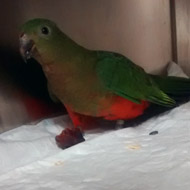
Owners urged to make sure birds are fitted with a microchip or numbered ring
The RSPCA is urging bird owners to make sure their pets can be positively identified after two parrots were found at educational facilities in Cardiff within a matter of days.
The first bird, an African grey, was found at Cardiff University on 6 March and reunited with its owner following an RSPCA appeal.
The second parrot, found at Vale College last Wednesday (21 March), was wearing a ring but not microchipped, prompting the charity to issue a search for the owner.
The RSPCA has since transferred the parrot to a veterinary practice in Cardiff where it is hoped that somebody will come forward with information.
“This green parrot - potentially an Australian king - was spotted flying around the Cardiff and Vale College on Trowbridge Road, clearly lost from home," said RSPCA animal collection officer Gary Lucas. "The bird is now at a veterinary practice in Cardiff, and we’re desperately hoping an owner comes forward, or someone with information which can help us get this beautiful bird home."
In 2017, the RSPCA collected more than 1,400 psittacines across England and Wales, of which 453 were strays. The charity says that it often finds it difficult to reunite the birds with their owners as the majority are not ringed or microchipped.
In light of recent events, the RSPCA is now urging parrot owners to make sure their pet can be identified with a microchip or numbered ring. It also advocates the use of a parrot passport, which contains advice for new owners on how to help keep their birds safe and secure.
Mr Lucas continued: “Our inspectorate appeal line can be reached on 0300 123 8018 – and anyone claiming to own the parrot, who isn’t microchipped, but is wearing a numbered ring, will need to provide proof the animal belongs to them.”



 The latest
The latest